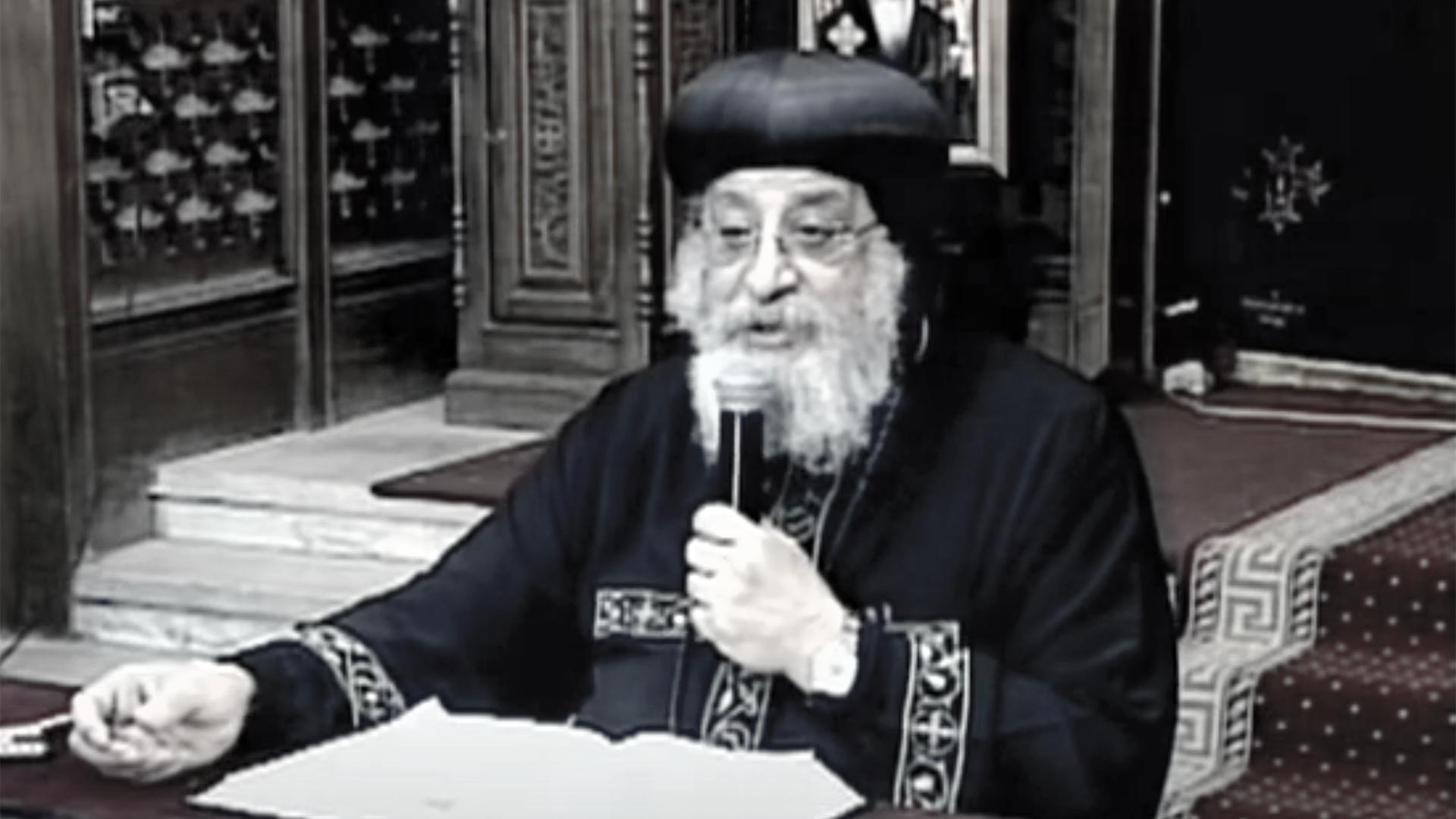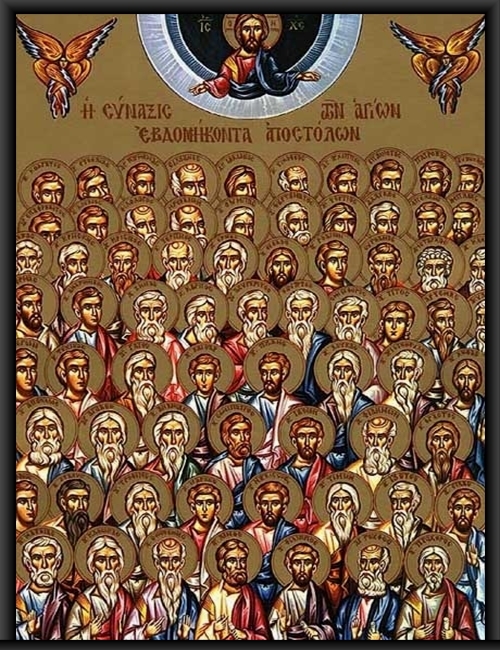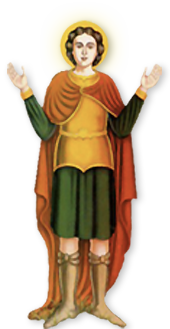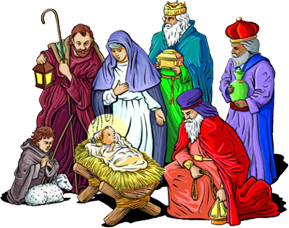Coptic Orthodox
On the 11th day of Tout, St. Basilides (Wasilides) who was a minister and counsellor for the Roman Empire, was martyred. He had many slaves and servants. Emperor Numerianus was the ruler, who was married to Basilides' sister, Patricia, and had a son called Yustus. Patricia was also the mother of Theodore El-Mishreke. Basilides had two sons: Awsabyos (Eusebyus) and Macarius.
When the Persians waged war against Rome, Emperor Numerianus sent to them his son Yustus and Awsabyos, Basilides' son. Then he went to fight another enemy and was killed in that war. His kingdom was thus left vacant without a ruler.
The people chose from among the soldiers a man called Agrippita, who was a shepherd, and they set him over the royal horses, stable. He was a mighty man in action, bold in his dealings. One of the emperor's daughters looked at him and took him as her husband. She made him emperor and called him, "Diocletian." Shortly after, he forsook the Lord God of Heaven and worshipped idols. When Wasilides heard this, he was sorrowful, and he did not return to the service of the new Emperor.

لتحميل النسخة العربية اضغط هنا
In the Name of the Father, the Son, and the Holy Spirit, One God. Amen.
I congratulate you, my beloved, for the Glorious Nativity feast and beginning the New Year of 2015. I hope you to have a new year full of blessings, goodness, love, joy and peace. In fact, I am so happy to communicate with you through this message—to all the beloved at every Coptic Orthodox Church all over the world, every family, all youth, all servants, the board of the church, all children, and all brethren.
When God created humanity, He intended them to be in continuous communication. He wanted them to be the crown of creation. After creating all things first, He created the King of all creation on earth. Man, having the breath of God, was the great creation of God. But sin came and humiliated him and cast him away from what God planned for him. Since the sin of Adam and Eve, our first parents, humanity came into struggle with all aspects of sin in their lives. There are three main weaknesses that dwelled in humanity as a result of original sin.
The first is Dominance by the Ego. The ego of the human being became his own god or idol. Man began to worship his ego along with power, desires, and all that resulted therefrom. When we look to the world, we find that the dominance by the ego
The Papal Encyclical for the Glorious Feast of the Resurrection, 2015

لتحميل النسخة العربية اضغط هنا
In the Name of the Father, the Son, and the Holy Spirit, One God. Amen.
ÉÉ<rictoc ÉAnec]@ Aly;oc ÉAnec]
Christ is Risen. Truly, He is Risen.
I congratulate you on the glorious Feast of the Resurrection, which is the joy of all our joys, and the feast of all of our feasts. Resurrection in the Christian life is not just a historical event. Neither is it a mere occasion that we honor with a variety of celebrations, nor just an ordinary passing day. Resurrection is the foundation of our path of salvation which our Lord Jesus Christ completed on the wood of the cross. Resurrection is the focus of our faith. It is the realization of the forgiveness of all humanity. Resurrection is the core of spiritual struggle, since spiritual progress without the resurrection is meaningless. Moreover, it is the hope and promise of the coming eternal life. Without resurrection our Christian faith is pointless. Without resurrection, there is no peace for our daily earthly lives. Without resurrection, we have no hope for the future. The light of the resurrection illuminates our lives and brightens the path of every individual through each stage.
One may ask: “Did Jesus really come and die?”
Khristos Anesti; Alithos Anesti!
Pi-Ekhrestos Aftonf; Khen O Methmi Aftonf!
Christ is Risen; Truly He is Risen!
 For Easter Papal Message 2014 in Arabic Click Here
For Easter Papal Message 2014 in Arabic Click Here
I congratulate you my beloved with the Glorious Resurrection Feast that is the crown of our feasts and joy. Christ’s Resurrection is the main foundation in our Christianity, our Church, our evangelism and our daily life. Christ’s Resurrection is considered everything to us. The Cross of our Lord Jesus Christ is considered our new life that we can live in.
In Christ’s Resurrection, we have three main aspects.
- Before Crucifixion and Resurrection, Our Lord Jesus Christ was a teacher and a shepherd
- During Crucifixion until Resurrection, He was a reconciliator and a liberator
- After Resurrection, our Lord Jesus Christ was present and became a companion to every man. How?
 By Jeffrey Wang
By Jeffrey Wang
The Feast of Nayrouz marks the Coptic New year and the Coptic calendar is one oldest calendars in the world. To better understand the importance of the Feast of the New Year, which is on the first of the month of Thout, it is very interesting to see the word Nayrouz comes from the Coptic word “niiaroouz” which means rivers. Mid-September is usually the time when the Nile River waters rise and prayers are raised to God for the rising of the waters of the rivers for irrigation and good crops.
During the persecution of Christians under the Roman Emperor Diocletian starting in 283 A.D., the Coptic Christians adopted their calendar for church liturgical use. The persecution by the emperor was so severe and bloody that the Copts called this time the Era of the Martyrs or Anno Martyri in September of 283 A.D. Therefore, at the start of each year, we celebrate the Feast of Nayrouz to honor the millions of martyrs who shed their blood for our Lord, God and Savior Jesus Christ.
The Feast of Nayrouz is all about the newness of a new year, a new life and new beginning. We are indebted to the martyrs from Egypt. They shone as beacons of light and gave the people strength in their faith. They have kept our Coptic Orthodox Church strong until this day. If not for the fearlessness of the martyrs, the Church would not be as it is today. The feast usually falls on the 11th or 12th of September. As we celebrate the new Day, we remember our eagerness to share with the martyrs the new day in which they entered Paradise. This is the new season where the brightness of the Glory of Christ shines, and we look toward our Lord who will, God willing, open the gates of Paradise for future martyrs and for us. The last two weeks before the feast contain Divine Liturgy readings that focus on the second coming of our Lord. May we be ready for that Day.
During the Feast, all prayers are done in the joyful tune and this continues until the 16th day of Thout. In the Divine Liturgy, all the readings celebrate this New Year.
We hear about the newness of the year in each of the readings of the Divine Liturgy. In the Psalm we hear “Bless the Crown of the Year with Your goodness.” In the Gospel, the Savior blesses the New Year in abundance, saying, “to proclaim the acceptable year of the Lord” (Lk. 4:19). In the Pauline Epistle, St. Paul writes: “the old has passed away, behold, the new has come” (2 Cor. 5:17). St. John delivers a similar message in the Catholic Epistle, saying that “the darkness is passing away and the true light is already shining” (1 Jn. 2:8). The Feast strengthens our desire to repent and return to God with all our hearts. We try to give our Lord a blessed New Year. St. Luke emphasizes this point in the Book of Acts, “The times of ignorance God overlooked, but now he commands all men everywhere to repent” (Acts 17:30).















 Subscribe to RSS Feed
Subscribe to RSS Feed